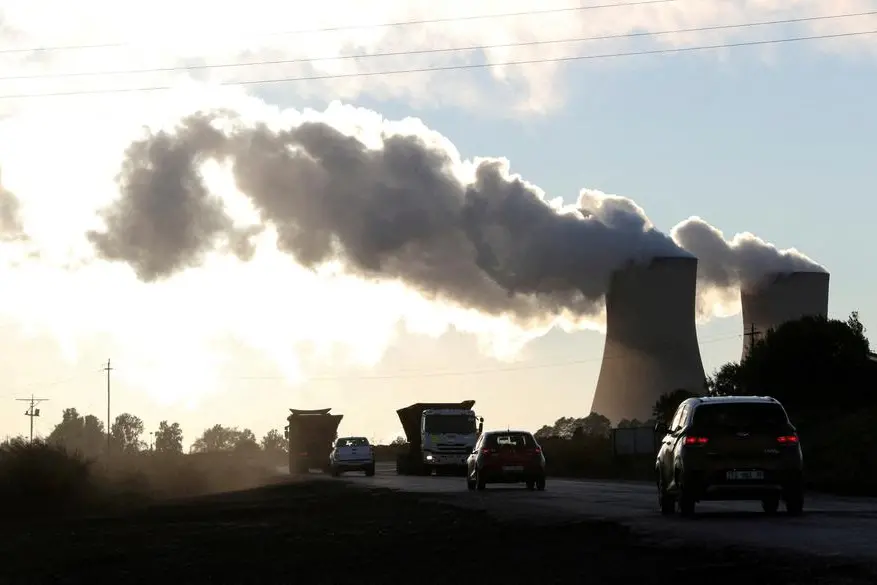PHOTO
Four of South African state utility Eskom's 15 coal-fired power plants are breaching government emissions regulations as it pushes ageing facilities to their limits, a Reuters analysis of company data found and Eskom officials confirmed.
Africa's most developed economy is facing its worst power crisis on record, with a persistent electricity shortfall necessitating daily scheduled rolling blackouts - known locally as loadshedding - of up to 10 hours for the past 18 months.
Two senior Eskom officials and Electricity Minister Kgosientsho Ramokgopa told Reuters they were aware of the violations, which last year helped reverse a four-decade trend of declining emissions of so-called particulate matter - mainly ash and soot.
However, they said making the plants compliant would take time and could undermine efforts to address the power shortfall. This leaves South Africa in the meantime with a choice between keeping the lights on and protecting the health of its citizens.
The environment ministry did not respond to Reuters questions about the emissions violations.
"We've got a constrained system. It's just that there's not enough space for maintenance, and there is sometimes a trade-off made," Deidre Herbst, Eskom's senior environmental manager, said of the emissions breaches.
Though some 80% of South Africa's electricity is generated from burning coal, Eskom had succeeded in reducing particulate matter emissions by 75% through a programme of plant upgrades launched in the 1980s, Herbst said.
But with power cuts expected to erase two percentage points from economic growth this year, she said Eskom is having to run plants harder and delay upgrades to keep generating power.
Company-wide, Eskom's particulate emissions last year were at their worst levels since the early 1990s, an internal Eskom presentation reviewed by Reuters showed.
"We've really been struggling a bit in the last couple of years," said Herbst, who acknowledged that the power plants have been exceeding emissions limits for the last six to 12 months.
Of the four plants in breach of regulations - Matimba, Matla, Kendal, Kriel - two were emitting more than double the permitted limit of particulate matter in February, the most recent month of available Eskom data showed.
The 35-year-old Kendal power station emitted an average of between 10- and 30-times the permissible limit, Eskom's data from January showed.
"It's a health hazard," said Lauri Myllyvirta, lead analyst at the Centre for Research on Energy and Clean Air, a Finland-based environmental research organisation.
Myllyvirta, who has studied Eskom's environmental impact for nearly a decade, said South Africa's emissions thresholds are significantly less strict than those of most developed nations.
"These plants have a very high impact on air quality and health impact even when they are respecting their emission standards. But these breaches just make it a lot worse," he said.
HITTING THE POOR HARDEST
Three of the four facilities are located in the Mpumalanga province coal belt, among South Africa's poorest regions with nearly half the workforce unemployed.
An unpublished government study reviewed by Reuters in 2021 found that more than 5,000 died there annually due to the government's failure to fully enforce its own air quality standards.
Thomas Mnguni, a Mpumalanga community activist with environmental non-profit GroundWork, said poor communities living near Eskom plants and coal mines were hit the hardest.
"We will not accept the thinking that, because of loadshedding, Eskom can pollute as much as they want," he said.
The environment ministry can take Eskom to court over emissions violations to either force it to comply with regulations or shut down operations. But the process can take years.
The government has already brought a criminal charge against the Kendal plant for violating standards between 2015 and 2017. But the first hearing in that case is only expected to take place in November.
The four plants currently breaching emissions limits account for around 10,000 megawatts of power output, or more than a third of Eskom's total available power capacity.
Eskom's Herbst said the Kriel and Matimba facilities could be brought into compliance with the regulations relatively quickly, but Kendal was a bigger challenge.
Bheki Nxumalo, Eskom's head of generation, told Reuters that the company understood the need to prioritise fixing heavily polluting plants.
He said that one of Kendal's generating units was already offline as Eskom carried out upgrades and maintenance on its six units one by one.
"That is why our outages are so long now," he said. "(In the) next two years, most of the plants will be within limits."
(Reporting by Promit Mukherjee Editing by Joe Bavier, Alexandra Hudson)





















